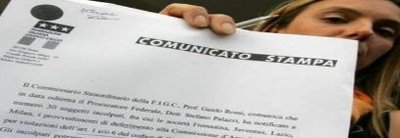Serie A quartet to stand trial
 Serie A champions Juventus, AC Milan, Fiorentina and Lazio have been named as the four teams who will face a sports court over allegations of corruption in Italian football. The hearings will begin on Thursday 29 June at the Olympic Stadium in Rome, Italian federation (FIGC) prosecutor Stefano Palazzi confirmed.
Serie A champions Juventus, AC Milan, Fiorentina and Lazio have been named as the four teams who will face a sports court over allegations of corruption in Italian football. The hearings will begin on Thursday 29 June at the Olympic Stadium in Rome, Italian federation (FIGC) prosecutor Stefano Palazzi confirmed.The scandal broke when Italian newspapers published transcripts of telephone conversations between senior FIGC officials and Juventus general manager Luciano Moggi discussing refereeing appointments. Moggi resigned following the revelations.
While Juventus were the side at the centre of the inquest, the Turin giants are expected to run the biggest risks. They could face anything from docked points to stripped titles and demotion into Serie B or even Serie C. However, as yet the FIGC has not confirmed what precisely the prosecutors are asking for. It's believed that information will be released tomorrow.
AC Milan insisted they were the victims of sporting fraud rather than the perpetrators, but they too have been indicted. Lazio and Fiorentina are thought to have had secondary roles, yet risk demotion if their involvement in sporting fraud is proved.
With 13 members of Italy's squad at the World Cup playing for the four teams, the FIGC waited for the conclusion of the Azzurri's final World Cup Group E game against Czech Republic before making the announcement. Italy won the match 2-0 to progress to the knockout stages.
In an eight-line press release, it was confirmed that defendants from the four clubs would receive the 108-page dossier into the investigations tomorrow morning. A total of 30 people are under investigation, but due to Italian privacy laws, none of the names could be released.
The clubs have been indicted for violation of Article 1 and/or 6 of the Code of Sporting Justice. Article 1 refers to the “general duties and obligations”, whereas Article 6 is more serious. The latter notes: “altering the result of a match or securing an advantage in the table with any means is considered sporting fraud. The clubs, its directors and players have the duty to inform the authorities if they believe this is in progress.” In effect, a club or individual only charged under Article 1 does not risk a great deal, but Article 6 is where the serious repercussions come in. Even then, it depends on whether they are in direct or indirect violation of Article 6.
The FIGC intend to conclude the trial by July 9, when the World Cup final will be played in Berlin so any appeal will be heard between July 7 and 9. The final appeal, at the Federal Court, will give its verdict before July 20.
Juventus finished top of the table ahead of second-placed AC Milan in Serie A last season, but were only awarded the title on a "provisional" basis, according to former FIGC president Franco Carraro. Carraro resigned in May, along with Moggi and the entire Juventus board.



0 Comments:
Post a Comment
<< Home